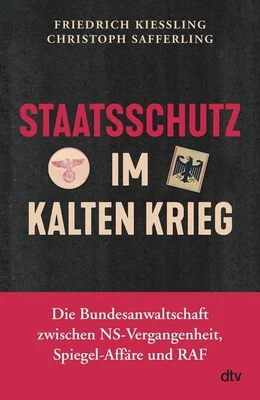Recent publications

Der Streitfall. Wie die Demokratie nach Deutschland kam und wie wir sie neu beleben müssen ("The Dispute. How Democracy Came to Germany and How We Need to Revitalize it")
On the occasion of 75 years of the Basic Law, Friedrich Kießling and Christoph Safferling analyse the long way to democracy in Germany and the many changes it has undergone since 1949. On this basis, they also take a look at the challenges facing democracy today.
(Publication from the publisher1)
Friedrich Kießling/Christoph Safferling: Der Streitfall. Wie die Demokratie nach Deutschland kam und wie wir sie neu beleben müssen. München 2024.

Staatsschutz im Kalten Krieg ("State Security in the Cold War")
Staatsdiener der Diktatur, Anwälte der Demokratie ("Public Servants of the Dictatorship, Lawyers of Democracy")
The Federal Public Prosecutor's Office is charged with protecting the democratic order and contributing to the unity of the law. In the early Federal Republic, it dealt with communists with a heavy hand, was involved in the so-called Spiegel affair of 1962 and it had to face a previously unknown threat by fighting the emerging RAF in the early 1970s. At the same time, the Federal Public Prosecutor's Office shied away from dealing with the past of its staff—although many had already held important legal positions in the "Third Reich". For the first time, this book explores the history of the Office of the Attorney General between 1950 and 1974. It highlights the highly topical question of how a democracy can protect itself without betraying its own values.
Friedrich Kießling, Christoph Safferling: Staatsschutz im Kalten Krieg. Die Bundesanwaltschaft zwischen NS-Vergangenheit, Spiegel-Affäre und RAF, München 2021. (Publication from the publisher2)
Videostream3 of the book presentation on 18 November 2021 in Karlsruhe.
Report in the Tagesschau4 of 18 November 2021.
Podcast "Bundesanwaltschaft - Nach dem Krieg von Alt-Nazis geprägt5" on SWR.

Außenbeziehungen und Erinnerung ("Foreign Relations and Remembrance")
Remembering foreign policy events is also relevant for a wider public. But how and when do we refer to past foreign policy? And what influence do memories have on foreign relations? To answer these questions, authors from the fields of history, history didactics and political science examine case studies from different epochs and world regions, drawing on concepts from cultural-scientific memory research.
Friedrich Kießling, Caroline Rothauge (Hg.): Außenbeziehungen und Erinnerung. Funktionen, Dynamiken, Reflexionen, München 2021. (Publication from the publisher6)

Agrarpolitik im 20. Jahrhundert ("Agricultural Policy in the 20th Century")
In this volume, the Independent Commission of Historians, set up by the Federal Ministry of Food and Agriculture, deals for the first time with the history of the Reich Ministry of Food since the founding of the Weimar Republic in 1919, its development during the National Socialist dictatorship, the allied occupation administration after 1945 and, from 1949 to 1990, the history of the Federal Ministry of Food and Agriculture and the GDR Ministry of Agriculture. The focus is on institutional structures as well as the respective personnel policies before and after 1945, including the question of civil servants incriminated by the Nazis. In a final chapter, the Europeanisation of agricultural policy is presented, going beyond the year of reunification.
Horst Möller, Joachim Bitterlich, Gustavo Corni, Friedrich Kießling, Daniela Münkel, Ulrich Schlie (Hg.): Agrarpolitik im 20. Jahrhundert. Das Bundesministerium für Ernährung und Landwirtschaft und seine Vorgänger, Berlin/Boston 2020. (Publication from the publisher7)

Zivilmacht Bundesrepublik? ("Civil Power Federal Republic?")
This interdisciplinary volume examines the explanatory power of the role concept of "civil power" for the foreign policy of the Federal Republic of Germany from the perspectives of political and historical science. On the basis of European as well as global issues, it is analysed to what extent the foreign action of the Federal Republic before and after 1989 can be understood with the help of this role concept. However, the focus is also on similar historical role concepts such as that of a necessary foreign policy of "restraint", on possible alternatives to the role of a civil power or also on deviations from corresponding role concepts in the foreign policy practice of the Federal Republic.
Klaus Brummer, Friedrich Kießling (Hg.): Zivilmacht Bundesrepublik? Bundesdeutsche außenpolitische Rollen vor und nach 1989 aus politik- und geschichtswissenschaftlichen Perspektiven, Baden-Baden 2019. (Publication from the publisher8)

Die Marke Deutschland in der Welt ("Germany as a Brand in the World")
The question of international role conceptions of the Federal Republic of Germany has been the subject of intense public and academic debate in recent years. The "History and Society" - special issue takes up these debates and gives them greater historical depth. In analysing examples taken from the history of foreign representations, development policy as well as West Germany's economic history, it becomes clear how intensively debates about the international position of the Federal Republic of Germany have been conducted from the beginning of the West German state. From a more theoretical perspective, the issue also makes the concept of "nation branding", known from international history, as well as the model of international role concepts, discussed above all in political science, applicable for the international history of the Federal Republic.
Jessica Gienow-Hecht, Friedrich Kießling (Hg.): Die Marke Deutschland in der Welt. Geschichte und Gesellschaft 45 (4/2019). (Publication from the publisher9)
Links
- https://www.dtv.de/buch/der-streitfall-28404
- https://www.dtv.de/buch/staatsschutz-im-kalten-krieg-28264
- https://www.youtube.com/watch?v=2OTEEf0OPHI
- https://www.tagesschau.de/inland/gesellschaft/bundesanwaltschaft-ns-vergangenheit-101.html
- https://www.swr.de/justizreporterinnen/bundesanwaltschaft-nach-dem-krieg-von-alt-nazis-gepraegt-100.html
- https://www.degruyter.com/document/doi/10.1515/9783110726442/html
- https://www.degruyter.com/document/doi/10.1515/9783110655308/html
- https://www.nomos-elibrary.de/10.5771/9783748904878/zivilmacht-bundesrepublik
- https://www.vandenhoeck-ruprecht-verlage.com/aktuelles/ggmarkedeutschland


